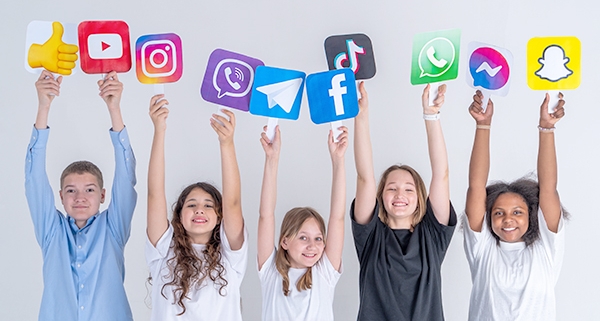6 Tips on how to keep your child safe on social media
Kids these days…
They’re almost always indoors. Influencing, and TikTok-ing, and weird internet challenge-ing.
These days, smartphones are the name of the game, and nearly every single child has one. We don’t even need to sing their praises, goodness knows you can probably get them to do that themselves. From scrolling through social media to snapping millions of selfies, if it ain’t a smartphone, teenagers nowadays ain’t interested.
Gone are the good ol’ days when we couldn’t wait to get home, not to do homework or anything – let’s get real – but we just couldn’t wait to get our hands on our parents’ classic Nokia cellphone so that we could spend the afternoon beating our previous score on Snake.
Fast forward a few years later and we had our very own brick of a phone with which to play games, try out polyphonic ringtones and send SMSs JUST long enough to not use up all our airtime and start sending “Please Call Me’s”. Just look how far we’ve come.
We live in the most awesome time in history – the digital age. Google has the answer to every question we can conceive, we never get lost because of GPS and TikTok captures our latest dance moves. But we all know that social media can be a tricky place to navigate, especially as a teenager. With their lives primarily lived online, teenagers are very vulnerable in the digital age and can easily find themselves in hot water if they don’t use the web responsibly. From cyberbullying to copyright infringement, avoiding these pitfalls is essential for staying safe and out of trouble. One innocent mistake can damage your child’s reputation, result in legal costs and even land them in prison. In this article, we’ll explore some of the ways you can help protect your child while they use social media.
- Set rules and expectations: Make sure your child understands the importance of being safe online. It may seem obvious to you not to share intimate information or photographs on social media, but explain the importance of this to your children. Talk to them about appropriate behaviour, such as not accepting friend requests from people they do not know, sending messages to strangers, and not meeting up with people they don’t know in person.
- Monitor activity: Many social media sites allow parents to monitor their child’s activity. Take advantage of these features and keep an eye on what your child is doing online.
- Educate yourself: Social media is more than a passing craze, it is a fundamental shift in the way our children communicate. Become familiar with the different social media sites your children use, so you understand how they work and can spot anything suspicious.
- Restrict access: Consider setting up restrictions on the devices your children use to access social media. You can also block certain websites and disable certain features. Teach your children that with great power comes great responsibility!
- Talk to them: It’s important to have regular conversations with your children about social media use, so they can feel comfortable talking to you if something bothers them or makes them feel uncomfortable online. Talk to them about context, tone and audience so they understand that saying something at a party to a particular audience is very different to posting something on social media where it can be misinterpreted and there is no little control over the audience.
- Report any suspicious activity: If you come across anything on your child’s social media accounts that seems inappropriate or dangerous, take action right away. Most sites have ways to report suspicious activity, so make sure to use these features if necessary.
By taking the time to protect your child while they are using social media, you can help ensure that they have a positive and safe experience. Remember – stay smart, stay safe and have fun in the digital age.
*Bonus* – if it feels wrong, don’t do it! That should be your mantra in the digital age. 🙂
Happy surfing!
Great reading
Mind Power courses
At Think Digital we’ve developed two short courses, Mind Power for Kids (ages 6 – 12) and Mind Power for Teens (ages 13 – 18), that is fun to take and teaches them how to navigate through life and remain positive and focused.
Free trial
Why not try our online learning environment by enroling for our free 14 day trial.






